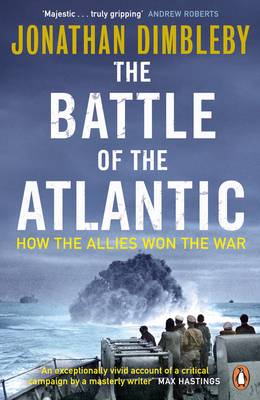

Wow! What a great book.
As the cover blurb and preface point out, the Battle of the Atlantic was really a campaign, or lots of battles, skirmishes, and so on, rather than a singular event, like, say, the battle of Waterloo, or even Kursk.
Even whilst Britain endured the so called ‘phoney war’, conflict had begun in earnest from day one on the high seas. And it would only finally end, or at least the movement of the ships themselves would only end, after Germany had officially surrendered. This makes it the biggest and longest battle or campaign of the war, for the British/Allied forces.
Thus many individual battles fall within the scope of this superb single volume account of what is a truly massive subject. From individual convoy battles, known by their convoy names/numbers, such as the calamitous PQ17, to larger scale actions, like the Battle of the River Plate, all the way through to huge operations, from Pedestal to Overlord.
Dimbleby proves himself very adroit at that highly effective kind of contemporary history that zooms in and pans out from the micro to the macro, from the rolling brine-washed decks of individual vessels to fleet manoeuvres, and from housewives and lowly ratings to Admirals and world leaders.
Rather oddly, perhaps, given the aforementioned ‘whole war’ scope of the subject, the book is most detailed on the 1939-43 period, which actually takes the reader to right near the end. The remainder of the war, including D-Day is somewhat rapidly glossed over.
That is my only real gripe, re this otherwise utterly brilliant work (oh, a glossary would’ve been useful). And in a way it’s not even a gripe as such, as Overlord, Dragoon – the latter not even mentioned – etc, whilst connected, are outside of the remit of the books’ core subject.
That said, over the book as a whole Dimbleby doesn’t baulk at including relevant stuff from other theatres. So the political horse-trading aspects, and what was happening in say the Pacific or on the Eastern Front, figure in this extremely wide-ranging and gripping account.
As with any good book, this inspires further reading. I now want to read Dimbleby’s recently published account of Barbarossa (the Atlantic book is subtitled ‘how the allies won the war’; the Ostfront one, with a pleasing symmetry, ‘how Hitler lost the war’). I’m also keen, having read numerous hefty volumes on Hitler and Stalin, to read more on Churchill and FDR.
Anyway, this was a truly epic read. Brilliantly written, telling a fascinating and compelling story. Utterly superb, and very highly recommended.
